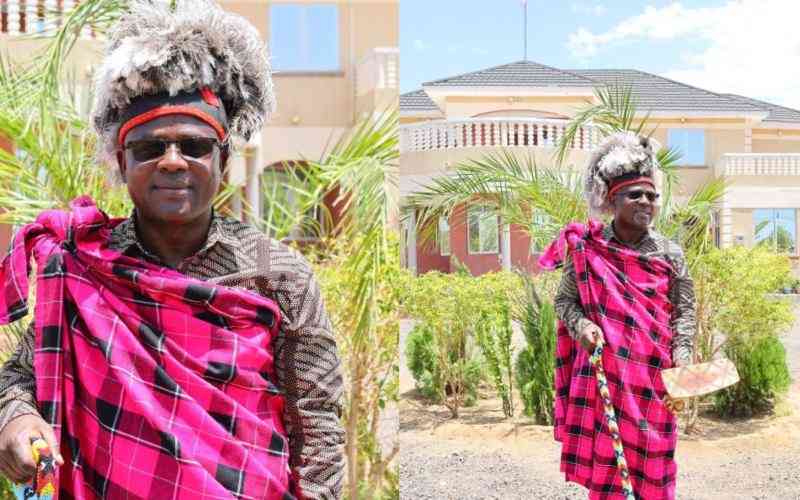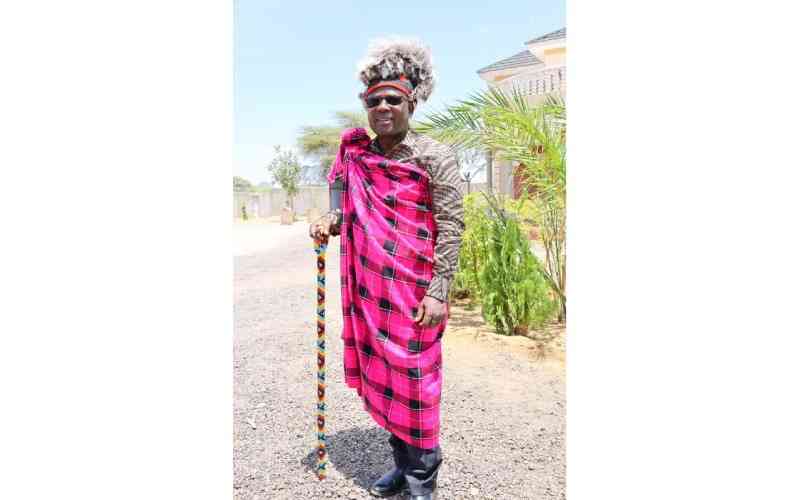
At the balcony of his fairly modest mansion on the outskirts of Lodwar town, Turkana Deputy Governor Dr Erus Lopeyok wakes up every morning to stare at the horizon in fervent honor of the wonders of nature.
Sometimes when the moon is full, and the night heat unbearable, he pulls a mattress and sleeps on the balcony counting his fortunes in the firmament. Providence has been on his side from the day he was born in Kalokol, 60 kilometres away from Lodwar.
In space and time, Dr Lopeyok was born in the most auspicious of places under the sun; the cradle of mankind, and that is a consciousness he loves to keep. On this day, we found him alone in the mansion, polishing up an academic paper about to be published in one of the distinguished journals.
Gazing at the lenticular clouds which had formed in the skies, he says he draws a lot of strength and energy, to continue discovering, serving and honoring his people.
"Sometimes a celestial feel is all you need. I find myself here meditating, and occasionally I sleep here," he says.
Lopeyok is among the many Turkana intellectuals who have shed off their lofty intellectual garbs and opted, in the old literary words, "to take Makerere back to the people."
From the hallowed halls of Universities in America, Lopeyok now lives off the Turkana heat, walks on Turkana sand, and devours Lake Turkana fish.
A researcher in theories of health and healing in African Ethno-medicine, indigenous research methodologies and theoretical frameworks for understanding the causes of war and promotion of peace, Lopeyok left the comfort of an "air-conditioned" academic life to serve Turkana.
"The many experiences I encountered growing up and working in Turkana predetermined my life to be one of service," he says.
Lopeyok is a veteran and graduate of Turkana's expansive civil society space, a product of the Catholic church. He served for many years in the Catholic Justice and Peace Commission.
After graduating as a teacher from Kericho Teachers College and teaching for a while, he went back to Catholic University and began his lifelong affair with the academy. In the process, he joined CJPC which specialized in human rights, civic awareness, justice promotion, sustainable livelihoods and rule of law.
At the height of his work, he undertook a social audit of the then municipal governance structure and uncovered a lot of rot.
"I remember Bishop Patrick Harrington coming to me and telling me; I like what you are doing but I will be sad if I will be the one presiding over your funeral," he says, recalling the place of CJPC in laying the basis for transforming Turkana in later years.
One other memory etched in his memory is traveling to one of the remote parts of Turkana and finding school-going children playing with ammunition and dangerous weapons.
"I couldn't fathom that, that happenstance transformed me," he says, remembering the long road traveled.
After a successful streak at CJPC and to cool off the pressures, Lopeyok bagged a Ford fellowship in the US in 2007 to study public health. While there he was involved in a number of programs all speaking to service the underprivileged of American society.
For 13 years, he lived the American dream, researching, serving and studying. The outbreak of the Pandemic in 2020 put him on the edge, stuck in a foreign land with a visiting mother.
She had traveled to the US to attend his doctoral defense on "No more war: a public health approach to identifying successful steps to promote peace in the horn of Africa", and to witness his crowning moment at University of Massachusetts, Amherst.
At her age, she was a high-risk exposure, and also with the son being one of the frontline health workers. The thought of both of them dying thousands of miles away from their beloved Turkana home fired him up but also troubled him a lot.
It turned out that it was a mutual worry.
"She would tiptoe to my room to see whether I was still breathing. At night, I would overhear her in her room praying aloud, asking God why he had placed me in harm's way," he explains.
Tucked in cold America with his mother, and in unprecedented times, Dr Lopeyok says he learned a lot of lessons. The Biblical exhortation on whether a woman's tender care could ever cease towards the child she bore replayed itself on a daily basis.
She pitied him and his American life, calling it cosmetic, isolated and brutish. Yet when he took her for a medical examination and she saw her vitals on screen for the first time, she was more than excited about America.
"Still, she was never convinced. She kept wondering why all those people she saw in the plane left Kenya," he says, in between bouts of laughter. She prayed that they would never go back to the US in case they left alive.
They braved it all, until they booked the first plane home. For all the care they took in the US, and God's grace, Dr Lopeyok first contracted Covid when he came back to Kenya.
For the first time in his life, he was hospitalized, and booked as "middle-aged healthy male African with cut marks all over his body." He survived the pandemic and lived to tell the story.
He holds two gentlemen; Dennis Whittaker and David Smith in high esteem for co-funding his higher education, something he never dreamt of while growing in Kalokol. "When Whittaker died, his last words were to wish that he lived long to witness my transition into a success, and to see me transforming the lives of Turkana people," he recalls.
For all the kindness they extended to him, Lopeyok multiplied it in leaps and bounds, helping out his community long before he joined politics. In the run up to last year's election, the current Governor Jeremiah Lomorukai came looking for him.
"When he came to talk to me, I was torn between my work, and my mother's prayer which was now being manifested in the request. It was a tough decision for me to make, but I am glad I made it."
Now, as he sits as the county's number two, he does not regret the decision he took. He fully subscribes to the thought that the wealth of Turkana has barely been explored. He believes the interventions they are making as a county will in the near future produce tangible results that the people can relate with.

He outlined their plans for Turkana, very grand plans, to lift up Turkana, and place it as an enviable place on Kenya and the world's map. From his chat, one could tell that Dr. Lopeyok does not want to dwell much into the past which he said is a sordid one.
The most important thing, he says, is that he is the Deputy Governor of the County and together with his Governor, they can turn the fortunes of Turkana people and carve their place in history.
"What I enjoy the most as a DG is being out there with our people; and looking at my ability and position of influence. I am an emotional person, and I enjoy my time the most with kids. They make me look at Turkana with a lot of hope," he says.
 The Standard Group Plc is a multi-media organization with investments in media
platforms spanning newspaper print
operations, television, radio broadcasting, digital and online services. The
Standard Group is recognized as a
leading multi-media house in Kenya with a key influence in matters of national and
international interest.
The Standard Group Plc is a multi-media organization with investments in media
platforms spanning newspaper print
operations, television, radio broadcasting, digital and online services. The
Standard Group is recognized as a
leading multi-media house in Kenya with a key influence in matters of national and
international interest.
